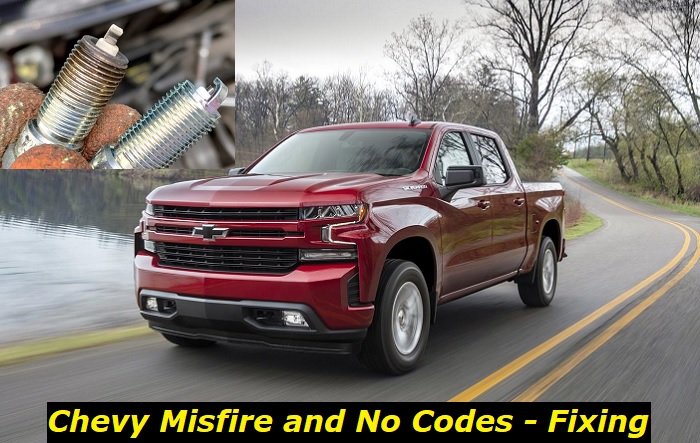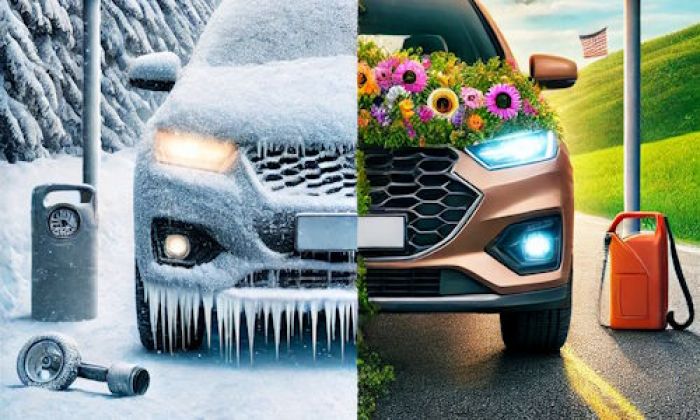Modern engine management has ensured that drivers rarely have to guess the cause of driveability issues. If your Chevy has misfired and no codes are displaying to allow you to make a quick and correct diagnosis, it may be tough to figure out your next step.
Engine misfire highlights
- Level of importance:Medium
- Commonreasons:No spark, electrical problems, no fuel, low fuel pressure, injection issues, compression problems, internal engine damage
- DIY inspection:Possible but very complicated
- DIY repair:Impossible, in most cases
- Price for repair:$500 - $1,600
- Can you drive?Usually, yes
- Ways to fix:Locate the issue and let a professional mechanic fix it for you

Why is Your Car Not Displaying an Error Code?
Your engine misfire should automatically trigger a check engine code. The most common causes of failure to display error codes are electrical or software malfunction. Where your monitor is not complete, your codes may recently have been cleared.
Chevy advises that drivers use their cars' information database to establish the criteria for setting a code. Solving your engine misfire is more urgent than addressing the lack of a code, so we will discuss that first.
Where to Begin
When dealing with a misfiring engine that offers no codes, asking the right questions is the best first step because it will help you successfully identify the problem. Good considerations include thinking about the state of your car when the misfire happened (or if it occurs intermittently).
Think about:
- The speed and load
- Engine warmup time
- Amount of fuel in your tank
- Type of fuel used
- Driving habits (are you a stop-and-go or highway-cruising driver)
- Repairs and servicing undergone before the misfire
- Previous engine failure issues and repairs
A natural next step (particularly for drivers dealing with a new-to-me Chevy) would be obtaining more information specific to your Chevy. Using a scanning tool is a simple way to get a wealth of information about your vehicle.
Some of this data may help pinpoint the cause of your engine misfire. For example, current and previous codes will reveal the mechanical issues your car has suffered under previous owners. These codes may be related to or indirectly disclose the cause of your current engine misfire.
Common Causes of Chevy Engine Misfire
Multiple misfires on your Chevy engine could be due to various issues. Some root causes include a faulty fuel system, internal engine failure, and a faulty ignition system. It is also common for an engine to misfire due to a worn-out spark plug coil pack, especially when it has been a while since you had a tune-up.
Your Spark Plug Wires or Spark Plugs are Worn/Faulty
If your Chevy has lost its spark, you will likely notice the following problems alongside intermittent misfiring:
- High fuel consumption
- Loss of accelerating power
- A rough idle engine that sounds jittery and sends resonating vibrations through your Chevy.
- Engine surges - inefficiencies cause sucking in excess air, causing a jerking start-stop movement.
- Trouble starting - due to lack of ignition spark
Old spark plug wires and worn-out spark plugs are typical causes of a car engine misfire. A spark plug is considered deficient when the insulator at the firing tip gets coated with either fuel, oil, or carbon. This coating allows the current to flow along the insulator nose and down to the metal shell and ground out rather than bridging the gap like in regular firing.
A rich fuel-air ratio and a poorly performing fuel injection system can cause the spark plug to be foul. Worn-out piston valves may allow too much oil to leak into the combustion chamber leading to oil fouling. Since you cannot clean the spark plug sufficiently to restore it to optimal operation, replacing it once it is coated is advisable.
Your Ignition Coil Is Failing
These signs will let you know your ignition coil may be on the fritz:
- Your car is sluggish due to loss of power caused by irregular sparks
- High fuel consumption due to the system injecting more fuel to compensate for spark plugs not getting enough power
- Backfiring - a loud bang caused by the explosion of unused fuel in the combustion cylinder. The noise is accompanied by a strong smell of gas and black smoke pouring from your exhaust.
- Stalling and hard starts due to insufficient voltage to spark plugs
- Coughing and sputtering sounds from a cylinder not firing during ignition.
- Vibrating or jerking when idling or hesitant jerk forward when accelerating.
Whenever your engine misfires, consider looking for loose engine ground wires. They can be the cause of random engine misfire conditions. Make sure that the loose wires are either connected or tightened where necessary.
Some vehicles have a separate ignition coil on each spark plug, while other cars only contain one coil with a sparking cable to each individual spark plug. When it comes to older cars, they have a distributor, and there are others with an ignition coil.
If the coils in your engine are separated, you should unplug each coil to inspect whether there is any cylinder malfunction. If you find any faulty ignition coil, you should replace the coil for the normal functioning of your vehicle.
Your Distributor is Faulty
Here is how to tell whether your Chevy is misfiring due to a faulty distributor:
- Strange vibrations or shaking felt throughout your vehicles when idle. This sensation is due to the distributor spinning incorrectly and affecting timing and firing.
- Difficulty starting, especially in cool temperatures or in Chevy's that are stored outside caused by cracking of the distributor cap.
- High pitch squealing noises when starting due to clogging of the distributor cap with grease and debris.
The ignition system works perfectly well whenever the engine distributor operates optimally. The distributor's primary function is to disburse current to the spark plugs beginning the engine performance. A faulty distributor might result from a slight carbon buildup inside the distributor.
This carbon trace building up is a good conductor of electricity, thus affecting the performance. It can short out the coil voltage and cause added damage to the terminal distributor cap. This results in a misfire in the spark plugs. Try and look for any cracks or carbon traces in the distributor cap.
Your Fuel Injector is Clogged or Faulty
After hearing your engine misfiring, you should also consider inspecting the fuel injectors and ensuring they are working correctly and responding accordingly. Multiple random misfires can signify clogged or faulty fuel injectors that should be replaced. You should ensure that the fuel injector's wiring is not damaged and misconnected.
Always consider the following causes of misfires when diagnosing a fuel-related misfire.
- Too much fuel
- Not enough fuel
- Incorrect atomization of fuel
- Faulty fuel
A rough engine idle is one of the most common symptoms of a clogged fuel injector. Since it does not block instantaneously, a clogging fuel injector has a certain feel. You are expected to experience a slightly rough idle during idling, but the effect will be minute during acceleration. It is not until the injector is almost entirely clogged that it creates a cylinder misfire all the time.
Your Fuel Pressure is Low
The most common symptom of low fuel pressure is an unresponsive throttle or a stalling engine. Since many issues result from low fuel pressure, it is essential to confirm your engine has the proper fuel pressure to enable the right air-fuel mixture.
Below are the symptoms that are associated with low fuel pressure:
- Unresponsive Throttle
- Difficulty Starting the Car
- Stalling Engine
- Check Engine Light Comes to Life
- Turbo Lag
- Misfires
- Low Performance
An engine with low fuel pressure on the cylinders can lead to intermittent misfires on multiple cylinders. When the engine does not get the required fuel due to low fuel pressure, it begins to lean misfire.
The fuel regulator or fuel pump could source low fuel pressure. The pressure provided by the pump must meet the specifications since the engine is calibrated to run like that. Fuel pressure that is below the desired pressure causes the engine to misfire
Other likely causes of your misfiring engine
- Your Crankshaft/Camshaft Sensor is Defective
- Your Engine's Timing is Knocked
- Your Head Gasket is Leaking
- Your Engine Compression is Low
- Your Fuel is Contaminated or Poor Quality
Cost of Repairing your Misfiring Chevy Engine
The cost of repairing your misfiring engine depends entirely on the cause or combination of reasons. Repair shops typically charge a fixed fee for diagnosis (about $100), which may or may not be deductible from your repair costs.
After diagnosis, you will receive an invoice indicating the cost of any parts that need to be replaced and the total hourly labor costs for implementing the repairs. Labor costs will vary greatly depending on your location, and the expertise of your auto repair exert.
Replacement costs depend on the quality of components you purchase and the model of your Chevy. Here are some national averages (labor plus parts):
- Spark plugs: $70-$300
- Spark plug wires: $200-$250
- Ignition Coils: $225-$650
- Fuel injectors: $1600-$2000
- Fuel pump: $1400-$1800
- Fuel pressure regulator: $250-$500
If your Chevy engine is misfiring, the problem is very urgent. It is advisable not to drive the car further than a repair shop to get it fixed. Attending to the problem immediately is the best way to ensure it does not cause additional damage over time.
About the authors
The CarAraC research team is composed of seasoned auto mechanics and automotive industry professionals, including individuals with advanced degrees and certifications in their field. Our team members boast prestigious credentials, reflecting their extensive knowledge and skills. These qualifications include: IMI: Institute of the Motor Industry, ASE-Certified Master Automobile Technicians; Coventry University, Graduate of MA in Automotive Journalism; Politecnico di Torino, Italy, MS Automotive Engineering; Ss. Cyril and Methodius University in Skopje, Mechanical University in Skopje; TOC Automotive College; DHA Suffa University, Department of Mechanical Engineering






Add comment